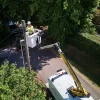Manufacturers Call for Permanent UK Infrastructure Authority
One authority to rule them all.. and in the darkness bind them. The EEF claims that the United Kingdom would benefit from the establishment of a permanent UK Infrastructure Authority to manage everything from long-term planning to investment and development of the national transport, energy and presumably also its communications (broadband and phone) networks.
The EEF, which claims to be “the most powerful force backing UK manufacturing“, has published a new paper that calls on the Government to “end political prevarication on the most pressing infrastructure challenges” by establishing a permanent Infrastructure Authority.
Advertisement
Apparently this new authority would “bring coherence” to debates on infrastructure challenges and encourage “vitally needed investment” in order to support growth and competitiveness, which could in turn end “decades of political wrangling and poor planning“.
Chris Richards, EEF’s Policy Adviser, said:
“Political prevarication and policy reversals have left Britain in the slow lane in developing its infrastructure for decades. The neglect of our roads, the indecision on expanding airport capacity and, the agonising over high speed rail routes connecting our major cities have only served to exacerbate the feeling that Britain’s infrastructure is not geared up to support growth.
We now have the opportunity to put in place a new independent system that will aid long-term planning supporting more of a consensus based approach in identifying future needs. All political parties need to commit to this in their forthcoming manifestos. In a nutshell, a UK Infrastructure Authority would add value by horizon scanning for future challenges, and ensuring debates are backed by trusted analysis.”
The paper proposes that the UK Infrastructure Authority would work in the “same effective way” as other similar institutions, such as the Office for Budget Responsibility (OBR). Under the EEF’s plan a parent board, which would be accountable to parliament, is proposed to lead the Non-Ministerial Government Department and maintain its impartiality.
The proposal also envisages that the new authority would need to conduct an assessment of the national infrastructure every 5 years in order to help plan for the next 10, 20 or even 50 years ahead, at both national and regional levels; plus an annual progress report for Parliament. Any suggestions would then be opened up for further consultation by the public, business and political parties etc., with final decisions still being taken by the Government of the day.
It’s possible that such an authority, had it existed 6 years ago, might have proposed a very different way forward than the somewhat vague direction given by the previous government’s 2009 Digital Britain report, which ultimately paved the way for today’s Broadband Delivery UK (BDUK) programme. Quite how different would be very open to interpretation, perhaps depending upon how far off into the future it would have looked.
Advertisement
At the same time proposing solutions is the easy part, while finding ways to fund those ideas, which can easily result in significant change, is often far more difficult. For example, it would be easy to propose a national Fibre-to-the-Home (FTTH) network for broadband, which we’d dearly love to see, but perhaps be rather more time consuming and challenging to both fund and build it.
Equally communications technology seems to move faster than transport and energy, which would make it hard to plan too far ahead because you can never be sure what might be invented in-between.. or indeed what might not end up being invented if a single direction were to dominate.
Separately the Government are currently also consulting on a new Digital Communications Infrastructure Strategy, which is also looking some 10-15 years ahead (here). But there is a fear that the results could be tainted by the desire to make big promises in time for next year’s general election, while a more independent authority might be able to deliver some balance.
Mark is a professional technology writer, IT consultant and computer engineer from Dorset (England), he also founded ISPreview in 1999 and enjoys analysing the latest telecoms and broadband developments. Find me on X (Twitter), Mastodon, Facebook, BlueSky, Threads.net and Linkedin.
« UPDATE TalkTalk Business Sends USA Piracy Warning Notice to UK Customer

















































Comments are closed